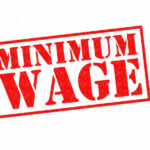In the light of dwindling government revenues and bloating cost of governance, the administration of President Muhammadu Buhari is contemplating cutting costs, including salary cut for public sector workers. In addition, the government is planning to trim the federal bureaucracy by merging Ministries, Departments and Agencies (MDAs) with similar and overlapping functions, all in an effort to do away with unnecessary expenditure.
Speaking at “Policy Dialogue on Corruption and Cost of Governance in Nigeria” organised by the Independent Corrupt Practices and other Related Offences Commission (ICPC), the Minister of Finance, Zainab Ahmed, disclosed that a committee which she headed was already working on the scheme in line with the directives of the president. She further disclosed that the president had also directed the National Salaries, Incomes and Wages Commission (NSIWC) to commence the downward review of salaries of all federal public sector workers.
To justify the development, Zainab pointed out that, “We still see government expenditure increase to a terrain twice higher than our revenue.’’
Amplifying the move for a leaner expenditure profile for the government, the Director General of the Budget Office, Ben Akabueze, disclosed that the cost of governance under the President Muhammadu Buhari administration rose sharply from N3.61tn in 2015 to N5.26tn in 2018, and N7.91tn in 2020. This, as he noted, excluded the cost of government enterprises and transfers to the National Assembly and the National Judicial Council (NJC). Speaking further, Akabueze noted that recurrent expenditure accounted for more than 75 per cent of actual MDAs’ expenditures with personnel costs accounting for 40 per cent of recurrent, while overhead was only three per cent in 2020 alone. He also compared the Nigerian situation with that of the US federal budget where general administration cost, including personnel and overhead, was less than 10 per cent of total budget.
Akabueze also identified the drivers of high governance cost as corrupt budget practices, bludgeoning cabinet sizes, proliferation of MDAs, election costs and bloated public service.
Following an uproar over the earlier statement on salary cut, the finance minister clarified that the federal government was harmonising salaries of MDAs and not a pay cut.
In a statement by Yunusa Tanko Abdullahi, her Special Adviser, Media and Communications, the minister said government was not thinking of cutting wages, rather it was working at salary harmonisation.
She said, “This is against the backdrop that there are some government agencies paying much higher than others for staff on the same grade level.
“What government hopes to achieve is to redistribute wages equally across board. Let us bring our salary structure within government agencies as close or as equitable and fair.’’
Against the backdrop of foregoing analytics and the prevailing state of financial distress faced by the country, the government’s resolve to trim cost of governance remains justified. It has also in this exercise commendably identified the causative factors that are driving the problem to be largely associated with the policy making and leadership class in government circles who are goaded by a compromised sense of discipline, frugality and even rabid kleptomania, in managing public resources. As is clear from the line-up of causative factors, the disturbing bloating of cost of governance is largely man-made and therefore, avoidable with prospect for remediation if the Buhari administration musters the resolve to execute such.
However, the inclusion of pay cut under the guise of harmonisation or whatever for federal government workers remains a most touchy and ill-advised aspect which the government needs to consider with discretion. From several angles, the initiative remains problematic just as it is hardly justifiable. Firstly, the unjustifiable escalation in government expenditure derives less from the salaries of workers than from the indulgences of the ruling class. Hence to contemplate reviewing salaries downwards at this time is tantamount to robbing them to appease the ruling class whose mismanagement of the economy remains the primary cause of the problem. Besides, the action will earn for the government the unenviable image of an insensitive and ungrateful administration which has failed to appreciate the dilemma of Nigerian workers who at this period of the ravages of the COVID-19 outrage supported the government by playing down all forms of restiveness.
The government needs to jettison any thought of tampering with workers emoluments. Rather, it should think out of the box and focus on restructuring the machinery and processes of administration, including cutting the wide areas of waste around the indulgences of the ruling class where lie the demons that bloat the cost of governance.

 Join Daily Trust WhatsApp Community For Quick Access To News and Happenings Around You.
Join Daily Trust WhatsApp Community For Quick Access To News and Happenings Around You.


